Why you should read Rivals as literary fiction
Dame Jilly Cooper’s raunchy novels are now taking streaming services by storm, but still aren’t taken seriously, argues Marina Woods

Dame Jilly Cooper is the crowning literary scion of 1980s Britain, responsible for authoring forty books (one of which has inspired a recent television adaption on Disney Plus) and for introducing millions of young women to the idyll of rural upper-middle-class life.
Cooper describes her novels as “a bit of everything, really,” but among commentators there is a stubborn temptation to pin each down as a kind of ‘woman’s story’, whether the soap (per Paste Magazine), the bonkbuster (says the Financial Times), chick-lit (according to The Guardian) or — worst of all — the guilty pleasure (said one-time PM Rishi Sunak). These are the genres regularly dismissed as fluff, which is how our culture regards art that makes women’s lives look like fun.
“Rivals is fantasy-deluxe, as implausible as Game of Thrones”
Cooper’s magnum opus, Rivals, was first published in 1988 and is the second novel in her sprawling Rutshire Chronicles series. Like the rest, it has a cast of characters so lengthy that the first nine pages are dedicated to listing names. You may think this excessive, and to that I offer a summary of the plot.
Lord Tony Baddingham, a sexually degenerate television franchise owner, is curtailing the creativity (gasp!) of TV personality Declan O’Hara, the new neighbour of Rupert Campbell-Black, who is having an affair with Baddingham’s mistress Cameron Cook, who is also seeing Declan’s son Patrick, whose sister Taggie is one half of a will-they-won’t-they romance with Rupert, who is part of a group attempting to steal Baddingham’s television franchise from him.
Cooper has a propensity for winding sub-plots that intersect and overlap with one another, and consequently Rivals is not a light read for those wanting to understand the machinations of franchise ownership. But Cooper has never promised realism. Rivals is fantasy-deluxe, as implausible as Game of Thrones. It narrates the friendship between a proud Irish Socialist (O’Hara) and Thatcher’s Minister for Sport (Rupert-Campbell Black) — a relationship that would not happen without enough compromise to warrant a separate novel. Despite his republican convictions O’Hara happily accepts a peerage from an English queen in a later book, while Cameron Cook, a media star, continues working with Lord Baddingham for some time despite his maltreatment of her.
The heart of the plot is a rivalry that becomes shallower the closer you look— and this is entirely the point. Rivals is a novel about redemption, and Cooper’s cast of characters must learn to shun the shallow pleasures of sex, alcohol and violence in order to find lasting happiness.
“Calling Rivals a guilty pleasure undermines its quality, however kindly it is meant”
Chief among them is Rupert, Cooper’s prodigal son, reckoning with the internal dissatisfaction that follows a life of self-absorption. Rivals is genius in that Rupert’s transformation does not necessitate a darkening of the mood. His loneliness is both deeply felt and funny; a Tory MP splitting his time between sexual conquests and the care of his many dogs. There’s no need for a protracted confession because Cooper keeps the reader in on the joke, aware of Rupert’s folly and his potential to overcome it.
Nor does Cooper’s approach demand that Rupert lay his soul bare. This would never do for the woman who in 1977 admitted “a sneaking guilty hankering for dominant males”. Instead she nudges him bit by bit towards that elusive goal of lasting pleasure, and towards his love-interest, Taggie, a woman so good-natured that investing in her character requires its own suspension of belief. Cooper’s narrative voice is the stabilising force of the novel, as essential as any rendezvous or grand gesture. Her humour serves to balm and guide, taking no prisoners and scattering puns regardless of the speaker.
Cooper’s books are famously tongue-in-cheek, but Rivals is a product of its time with references and values that are so 1980s it can be cringe-inducing. It is tempting to ask what the appeal of texts like Rivals is to modern women. For many, it is nostalgia, the thumbed pages and familiarity of a book well-loved. For others, it is fantasy and escapism, or vivid descriptions of valleys and lush rural landscapes.
Regardless: calling Rivals a guilty pleasure undermines its quality, however kindly it is meant. It is a novel interested in all varieties of love, from familial to carnal, to the love of money and material things. It employs all the tools of high melodrama—extramarital affairs, sabotage—but its camp sensibility does not dilute its feeling. I have read Rivals dozens of times, and for all the bawdy scenes and excessive boozing, what lingers is the love between Taggie and Rupert, between Lizzie and Freddie, Declan and Maud.
 News / Uni Scout and Guide Club affirms trans inclusion 12 December 2025
News / Uni Scout and Guide Club affirms trans inclusion 12 December 2025 News / Cambridge Vet School gets lifeline year to stay accredited28 November 2025
News / Cambridge Vet School gets lifeline year to stay accredited28 November 2025 News / Cambridge study finds students learn better with notes than AI13 December 2025
News / Cambridge study finds students learn better with notes than AI13 December 2025 Science / Did your ex trip on King’s Parade? The science behind the ‘ick’12 December 2025
Science / Did your ex trip on King’s Parade? The science behind the ‘ick’12 December 2025 News / Pembroke to convert listed office building into accom9 December 2025
News / Pembroke to convert listed office building into accom9 December 2025








